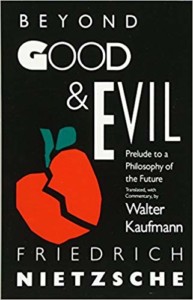From Nominalism to Nietzsche – How We Got Into the Mess We’re In Today
by Katrina J. Zeno, MTS
 Have you ever been on your way somewhere and you became delightfully distracted by another reality, so much so that you had to forsake the path you were on and investigate this new reality? Well, something similar happened with this blog.
Have you ever been on your way somewhere and you became delightfully distracted by another reality, so much so that you had to forsake the path you were on and investigate this new reality? Well, something similar happened with this blog.
For the past couple weeks, I’ve been happily pursuing a very distinct line of thinking through this blog – we’ve reflected on living by the highlights, then living the in-between times, then embracing the path of waiting, then primicia (the “first fruits”) as the promise of something more! All this was but a warm-up for the real topic that fills my every breath – divinization as a participation in Divine Trinitarian Life.
And then something happened on the way to writing about participation – I participated as a responder in a Q&A session on TOB and Gender Identity along with my dear bishop, Bishop Thomas Olmsted. During the Q&A, a bewildered audience member asked, “How did we get to where we are today? It seems as if it all just happened so fast.” He was referring, of course, to the change in our cultural understanding of marriage, sex, and gender that seems to be overtaking us at a dizzying pace.
I have to admit, his question set off a firecracker within me, which then exploded on the audience. After I finished my answer, I thought to myself, “Katrina, you talked way too long.” However, after the Q&A finished, I was unexpectedly showered with expressions of gratitude for explaining how our contemporary confusion didn’t just “happen” overnight but had been brewing for 700 years.
So, nudged by numerous pleas to put my answer in writing, we will “interrupt this regularly scheduled program” and turn our attention to a very condensed summary of Western thought since the 14th century in order to identify the roots of our modern approach to freedom of choice and to the body as raw material awaiting one’s self-chosen self-construction.
I’m not normally inclined toward creating a type of “visual formula” to explain my talks, but this topic begs a different approach, so here’s the “formula” we’re going to explore:
Quickly deciphered, it goes like this: Nominalism -> Descartes, Bacon, Darwin -> Nietzsche…and Marx. Got it? Here we go!
Our backwards time travel to unravel how we got to where we are today begins in the 14th century with a school of thought called Nominalism. Nominalism emerged as a reaction to the rather complex theological and philosophical systems of scholasticism, most eminently expressed by St. Thomas Aquinas and his Summa Theologica (13th century). This scholastic approach placed a pronounced emphasis on the intellect, deductive reasoning, and carefully articulated distinctions.
In contrast, Nominalism stepped back from investigating God and the world through the lens of the intellect and opted instead for the centrality of the will, what I like to call “God’s BIG WILL.” Similar to Cyrano de Bergerac who was only known for his BIG nose and nothing else (it’s a rare person who knows anything else about Cyrano’s life and personality), Nominalism zeroes in on God’s BIG WILL to the exclusion of His other divine qualities.
How did this happen? A Franciscan friar named William of Ockham (1280-1349) engaged in a series of “thought experiments” about God’s all-powerful will. He asked himself, “Could God command us to hate each other and to hate Him, which would then be the Law?” His answer was yes, because God’s will is the Law, and it can establish what is right and wrong without any need for explanation.
Ockham also asked himself “Could God bring a sinner, deep in mortal sin, to heaven without changing that person inwardly?” Again, his answer was yes, because God can produce any effect without needing any assistance (i.e., God doesn’t need any cooperation from us as secondary causes because His will is supreme).
Because Ockham exalted God’s BIG WILL above any other divine attribute, he confronted a rather BIG problem: the clash between God’s all-powerful will and “universals.” Universals, or natures, are interior, organizing structures and features of a thing that it shares with others of its same kind. For instance, all dogs participate in the universal nature of “dogginess.” We know a dog when we see it because it has a dog “nature.” As a result of this nature, all dogs share in common properties and ways of acting – you’ll never encounter a dog that meows or plays the cello but one that barks and buries bones.
So, what’s the BIG deal you might ask? It’s this (at least according to Ockham): If universals (or natures) exist then God is bound to act according to those natures and therefore subject to His own creation. In short, God could no longer be God because He isn’t all-powerful since He is forced to act in a certain way.
Ockham’s solution was to get rid of universals (natures) and to posit that only individual things exist. Consequently, the words we use to refer to these individual things are simply convenient labels. They don’t refer to anything permanent or unchanging in the essence of a thing; they are just arbitrary “names” (Nominalism means “name”) assigned to this or that object. Ockham’s strategy supposedly freed God to act according to His BIG WILL in whatever way God deemed appropriate without interference from universals, natures, permanent interior structures, etc.
The poisonous fruit of Nominalism is twofold: 1) God’s BIG WILL is isolated from the rest of God’s Divine Nature, including Love, Trinitarian Relations, Intellect and Wisdom, all of which are expressed in the natural order of creation (what we often call the “natural law”). And 2) Ockham introduced a radical split between language and reality. Since words are merely “names” that refer only to appearances but not to the inner reality of the thing itself, then the relationship between language and reality is arbitrary and superficial. In other words, we don’t encounter the inner reality, essence, or “form” of a thing through language, only its external properties.
Nominalism might have had only a “nominal” effect on Western culture if it hadn’t profoundly influenced Martin Luther (who feared God’s BIG WILL) as well as Renee Descartes and Sir Francis Bacon. Leaving Luther’s influence aside, let’s take a quick tour through Descartes and Bacon.
Renee Descartes (1596-1650) is most famous for his statement, “I think, therefore I am.” To 21st century ears, this observation sounds innocuous. But it isn’t. His statement introduced another radical split into Western thought – the split between consciousness and embodiment. Through Nominalism, reality had already become unhinged from language. Through Descartes, knowledge about reality (epistemology) became unhinged from the things themselves. What is truly real, he maintained, consists only in the ideas in the mind and not in the things themselves. He divided the human person into a “thinking thing” and a “corporeal substance” with the two dimensions only being accidentally related. This led to a disastrous dualism between what is subjective (my intellectual perceptions and judgments) and what is objective (what exists in reality apart from me).
Following directly in the footsteps of Nominalism, Renee Descartes likewise emphasized God as Will. He reasoned that because God’s all-powerful will is his most significant quality, then the most significant attribute of human beings, made in God’s image and likeness, is the exercise of our free will, our freedom of choice. But, here’s the catch: Descartes insisted that God’s will is exalted beyond our human knowledge so that we can’t understand God’s purposes for the created order. We can only understand how things are created (i.e., how things work), but not why things are created. In fact, he said trying to understand the end or purpose for which something was created is useless. In philosophical terms, Descartes ditched final cause or telos.
Let’s try to see the logic behind his statement: If what something is ultimately created for is unknowable to our minds, then it has no built-in purpose or telos. It is simply available as raw material for us to do whatever we want with it. Our mind and our consciousness, rather than God’s plan and purpose, assign meaning and purpose to all things. We don’t have to be Baby Einsteins to realize how Descartes’ logic breeds a utilitarian and narcissistic approach to the material world since reality has no objective meaning in itself, only subjective usefulness and value in our minds.
While Descartes was discovering his thinking self in France, Sir Francis Bacon (1561-1626) was busily developing the foundations of modern science in England through the experimental method, also based on nominalist thinking. From Bacon’s viewpoint, we are rational creatures who have been given dominion over creation (cf. Gen. 1:28) so it is our prerogative to dissect nature and map out its physical laws. By acquiring a vast knowledge of the material world and then combining it with our godlike faculty of willing, Bacon announced that we can become “lords and masters of nature.”
Bacon decisively linked knowledge with power for the Western mind. By accumulating knowledge through science, we accumulate power over the natural world. However, this godlike capacity to exercise power over nature is not unqualified, but, according to Bacon, must be enlisted on behalf of the “betterment” of mankind. The loophole in both Descartes’ and Bacon’s logic is gapingly obvious: Who determines what constitutes the “betterment” of mankind? What kinds of limits, if any, can be placed on man’s exercise of his BIG WILL and his subjective decision of what things are “for”?
I think it best to pause here and digest Nominalism, Descartes, and Bacon before pushing on to Darwin and his theory of natural selection. In the meantime, I encourage you to observe how the meaning of both language and our understanding of reality have changed and are manifested intensely in the contemporary conflict over marriage, sex, and gender. These realities no longer have an objective, interior organizing structure that is independent from our own subjective thinking. Rather, they can be changed and modified according to our own individual judgments and perceptions so as to be more “useful” (i.e., efficient cause) to our own goals and personal pursuit of happiness.
The same is true of the body. The purpose of science and technology is to make more options available for our BIG WILL to exercise its capacity of free choice, and any restrictions on this “godlike capacity to choose” is considered limiting and dehumanizing. Language itself has fallen under the modern guillotine of Nominalism as new words and pronouns rapidly multiply to describe self-constructed realities rather than an interior, objective order of reality. The “betterment of mankind” has morphed into the “betterment of the individual self” with the teeth of civil laws to back up one’s perception of self and reality. After all, if, according to Ockham and Nominalism, God could command anything He wanted and make it Law, then why can’t man – made in God’s image and likeness – do the same?
As you ponder all this, I pray you will experience even more profoundly the words I use to end every blog: And remember…you are a gift! (and not just a nominalistic, thinking, choosing thing…)
© Katrina J. Zeno, MTS
Jack Henz’ Reflection: Déjà vu, Vujà Dé: The “Mystery Clause” and Surprising Awakenings
The chill in the February 2018 night was heightened by a gusty north wind. Fifteen members of my adult formation class hurried from their cars into our warm classroom. Tonight’s class was planned to focus on the sin of pride and the balancing virtue of humility. Both were presented in Bishop Robert Barron’s “Seven Deadly Sins, Seven Lively Virtues” DVD series, but one simple comment took the class in a radically different direction.
About an hour into the class, Bishop Baron referenced the (in)famous “mystery clause” from the 1992 U.S. Supreme Court’s “Casey v. Planned Parenthood” decision that declared: “At the heart of liberty is the right to define one’s own concept of existence, of meaning, of the universe, and of the mystery of life.” Before I could speak, the class pounced on these fabricated “rights.” (Note: Names have changed to protect my memory.)
One man, Bill, said: “Today’s society is totally narcissistic. It’s all about me. Check out the media references to I-Phones, I-Pads, selfies, YouTube, #MeToo. It’s all about me to the exclusion of others.”
Mary, who is usually quiet, piped in: “That mystery statement says to me that we are free to determine what is real or unreal. My truth is different than your truth, but both are true from that person’s perspective. So, is there any real truth or is it all relative?”
Susan added: “My son goes to college and said that he was taught that knowledge is power. Science is leading the way for men to have domination over nature and life. So why do we need God?”
Fred quickly jumped in and said: “We were once ‘one Nation under God’ and now God is gone and replaced by ‘One Nation under I.’ It doesn’t make sense – what is happening?”
Jerry added quickly, noting I was ready to jump in: “What about fake news? Everything I hear and read in the media is someone’s opinion and rarely resembles reality as I know it.” At that moment, I called for a quick time out and gave the group a 5-minute break.
In my own head, my mind was racing: Déjà vu, I thought, I’ve heard this before. As I gathered my thoughts, I remembered attending Katrina’s November 2017 workshop where we discussed, “From Descartes to Darwin: How the West Got Rid of Human Nature.” For my part, I always carry a big, three-ring binder to my classes full of my favorite references to help me answer tough questions. Soon, copies of Katrina’s 6-page workshop handout were in my students’ hands.
Vujà Dé – an entirely new experience. I re-started class intent on sharing insights from Katrina’s workshop and personal experiences that might help the class address their questions. I only had 30 minutes.
I started, “Mary, your comments on the Casey v. Planned Parenthood mystery clause reminded me of the times I was sworn in as an expert witness at a trial. The court reporter rambled off the perfunctory, ‘Do you swear to tell the truth, the whole truth and nothing but the truth?’ and I chose to add, ‘So help me God, I do’ to the end of the oath. Over the past five years, God has become irrelevant for humans to tell the truth in court. To me, it seems as if objective truth has been replaced by relative personal truth.” Jerry quickly piped in, “I told you so. You can’t believe anything you hear in the media or a court room.”
Undaunted, I continued, “So perhaps truth has become more relative than any of us thought. In Katrina’s handout, you can read how nominalism and Descartes supplanted the importance of God’s will in our lives with the idea that humans are ‘god-like’ when they exercise their freedom of choice, especially as ‘lords and masters of nature.’ ”
Light bulbs were now popping everywhere
 Light bulbs were now popping everywhere in the classroom as Fred and Bill resounded almost in unison, “Now I get it!” Fred quipped: “Nominalism creates new words to use to define each person’s own subjective reality.” Bill wasn’t far behind: “Descartes diminished God’s purposes for creation and then added that humans have a right to construct their own reality like little gods because of their free will.” Finally, Jerry offered, “So that’s where all the fake news is coming from – everyone thinks their opinion is real and everyone else’s doesn’t matter.”
Light bulbs were now popping everywhere in the classroom as Fred and Bill resounded almost in unison, “Now I get it!” Fred quipped: “Nominalism creates new words to use to define each person’s own subjective reality.” Bill wasn’t far behind: “Descartes diminished God’s purposes for creation and then added that humans have a right to construct their own reality like little gods because of their free will.” Finally, Jerry offered, “So that’s where all the fake news is coming from – everyone thinks their opinion is real and everyone else’s doesn’t matter.”
Wow, they really were getting it, and my 30 minutes had overflowed to 75 minutes. It was time to end class with a prayer to St. Michael. As people left, they all echoed that this class was a gamechanger for them. I could hear them still talking as they drifted towards their cars. I locked up the classroom building and stepped out into the chilly February night. The northerly breeze quickly woke me up. What had just happened?
With the help of the Holy Spirit, Bishop Barron, and Katrina’s insights the class had gained invaluable awareness of how our societal “hot mess” had evolved and was impacting their everyday lives. For that matter, lightbulbs were still going off in my mind about how nominalism along with Descartes’ twisted view of the universe and Bacon’s empirical scientific method had reduced today’s reality to a utilitarian, narcissistic experience without God. Boy, I could hardly wait for next week’s class!
©by Jack Henz
We invite you to share your own 2-3 line reflection on our JPII Resource Center Facebook page by clicking here.
*Jack Henz is a retired meteorologist and a graduate of the Diocese of Phoenix ‘s Kino Catechetical Institute. Together with his wife Karen, he is a passionate catechist concerning all things Catholic, especially the Theology of the Body.





